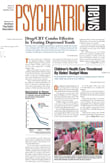How does a parent's assessment of a child's psychiatric symptoms compare with the child's own assessment? Not well, at least as far as anxiety and depression are concerned, past studies have revealed.
Further, a parent's assessment of a child's mania symptoms also appears to have poor concordance with what the child reports, a new study divulges.
The study was conducted by Barbara Geller, M.D., a professor of psychiatry at Washington University in St. Louis. Results were reported in the July American Journal of Psychiatry.
The study included 93 boys and girls who were aged 7 to 16 years and had a current DSM-IV diagnosis of mania for at least two weeks, with at least one of the two cardinal symptoms of mania—elated mood and grandiosity—to avoid diagnosing mania by symptoms that overlapped with those for attention-deficit/hyperactivity disorder. The Washington University in St. Louis Kiddie Schedule for Affective Disorders and Schizophrenia, a semi-structured interview instrument that asks about mania symptoms, was separately administered to parents about their children and to children about themselves. Different research nurses interviewed the parent and child in each family to avoid any bias from interviewing children after already interviewing their parents.
Parent-child concordance was poor to fair for all cardinal and noncardinal mania symptoms, the researchers found. Symptoms endorsed by just the child included substantial proportions of bipolar symptoms that have been shown to best differentiate mania from attention-deficit/hyperactivity disorder, such as elation, grandiosity, flight of ideas, racing thoughts, or a decreased need for sleep. Also noteworthy, the investigators found no significant differences in parent-child concordance by age of the child informant.
But just because parent-child agreement in the rating of children's mania symptoms was not all that good, is there reason to think that the children were more competent at rating their mania symptoms than their parents were? The answer is yes, Geller told Psychiatric News.
“For certain symptoms, such as decreased sleep need and racing thoughts,” she said, “parents may not know that a child is up most of the night or that a child has racing thoughts. Also, children may be aware that they are feeling super-happy when parents are more concerned with the child's elation interfering with school or church activities.”
These results have implications for clinical psychiatrists, Geller believes. “Children must be seen separately, asked questions in vocabulary and grammar that are age-appropriate, and must be interviewed by highly skilled child practitioners,” she said.
The study was financed by the National Institute of Mental Health.
Am J Psychiatry 2004 161 1278
